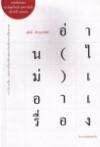
Chusak Pattarakulvanit
Bangkok: Kobfai Publishing Project, 2005 (2nd edition), 424 pp., paperback
Reviewed by Janit Feangfu
This book is a collection of thirty-one published essays on literary studies and criticism on both Thai and world literature written between 1993-2001 by Chusak Pattarakulvanit, the veteran literary critic and lecturer. The importance of the collection lies in its theoretical thrust in analyzing each selected literary text. The contribution of such a rigorous use of literary theory is crucial especially in the context of the paucity of theoretically grounded criticism of Thai literature as well as well-illustrated materials on literary theory available in Thai language.
The literal translation of the title Arn (mai) ao reuang is “read (not just) for comprehension” which, the author explains, calls attention to “reading that aims to analyze the construction of meaning, factors, and conditions which make possible the signifying process”. More importantly, it intends to uncover the ‘inconspicuous’ within a text” ([3]). The author emphasizes in the preface that reading literature is a social activity that is no less ideologically informed whether in the form of “common sense” or interpretive norms. Thus, it is crucial for the reader to be aware of such a controlling force, to resist, and to read against the grain ([4]-[5]).
The book is comprised of four parts and an appendix which includes the author’s two interviews on literary studies and the culture of criticism in Thailand, and a concise and virtuoso essay on the development of four mainstream literary theories namely Positivism, New Criticism, Structuralism, and Deconstruction. The four parts of the book are “On Literature”, “Criticism of Thai Literature”, “Criticism of World Literature”, and “On Literary Genres”. Essays in part one, “On Literature”, not only introduce the reader to the pertinence and challenge of reading critically, but also inquire into contemporary Thai reading culture and literary consumption as well as the construction of “professional writer identity”. In part two on Thai literature, the use of semiotic square, analysis of structural semantics, and narratology and deconstruction bring to the fore the richness of the selected novels, short stories and poems, and offer seditious interpretations of some well-analyzed, well-studied works such as Khang lang phap (Behind the Painting) by Sriburapha. Part three offers nine essays on world literature. The author demonstrates different theoretical approaches in reading the well-known works such as narratology and post-colonial theory in Albert Camus’ The Stranger and Arundhati Roy’s The God of Small Things. He also looks at the concept of time in Gabriel García Márquez’s One Hundred Years of Solitude. “On Literary Genres” in part four, Chusak introduces Magical Realism and Cyber Punk to the Thai reader as he also discusses political ideology in detective novels.
Despite the fact that Reading Against the Grain deals academically with literary studies and criticism, it is suitable for a general reader who is interested in literature. The accessibility of the arguments is due to the author’s systematic prose presentation and clarity of thought. The book’s contribution to literary studies in Thailand is already highly significant. Its encouragement for critical culture, however, might require more time.
